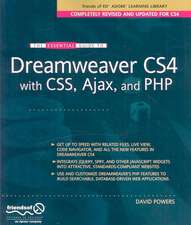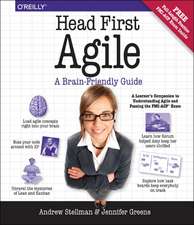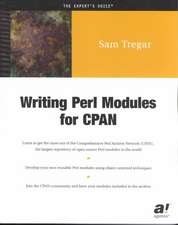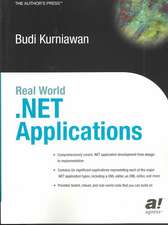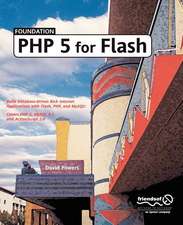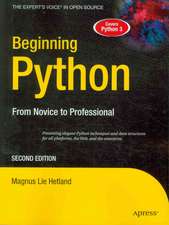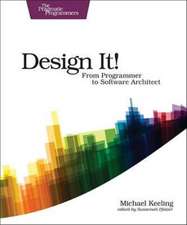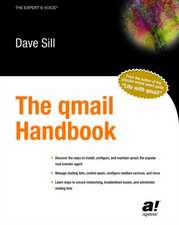Foundation PHP for Dreamweaver 8
Autor David Powersen Limba Engleză Paperback – 13 dec 2005
Dreamweaver 8 takes a lot of the hard work out of integrating a database into your websites, but it can't do everything. So instead of just giving you a series of instructions to click this and click that, this book helps you understand whats going on in the background. As a result, you're more likely to remember and to get it right.
Most books on PHP concentrate on code and throw all design considerations out the window. This one is different. It makes use of Dreamweaver 8's vastly improved CSS rendering, and shows you how to build a site thats smart in both senses of the word. It looks good and is intelligent too. You'll learn how to change the entire look of the site, using PHP to serve up different stylesheets each month. You'll also build a contact form protected against email injection attacks. All of Dreamweaver's PHP server behaviors are put through their paces, and you'll even make some custom server behaviors that will come in useful on any site you create.
Two chapters take you through the setup process with step-by-step instructions for both Windows and Mac OS X, helping you make the right choices: Apache or IIS? Remote or local testing? There are even instructions on how to set up virtual hosts on your own computer. And in the unlikely event that things go wrong, there's plenty of troubleshooting advice too.
In this book, we look specifically at using Dreamweaver's built-in server behaviors to build dynamic web sites using PHP and MySQL, the world's most popular open source server-side language and database server combination, which are both reliable, powerful, and open source (and therefore free to use). This version of Dreamweaver includes more powerful support for PHP and MySQL than ever before,and we'll show you how to make this work for you. No previous experience of PHP or MySQL is necessary to use this book.
Examples built throughout the book include a content management system, and an online image gallery. All examples are designed to meet modern usability requirements and be web standards-compliant.
Preț: 207.14 lei
Preț vechi: 258.93 lei
-20% Nou
Puncte Express: 311
Preț estimativ în valută:
39.64€ • 41.38$ • 32.80£
39.64€ • 41.38$ • 32.80£
Carte disponibilă
Livrare economică 14-28 martie
Preluare comenzi: 021 569.72.76
Specificații
ISBN-13: 9781590595695
ISBN-10: 1590595696
Pagini: 510
Ilustrații: XVIII, 530 p.
Dimensiuni: 191 x 229 x 27 mm
Greutate: 0.85 kg
Ediția:1st ed.
Editura: Apress
Colecția Apress
Locul publicării:Berkeley, CA, United States
ISBN-10: 1590595696
Pagini: 510
Ilustrații: XVIII, 530 p.
Dimensiuni: 191 x 229 x 27 mm
Greutate: 0.85 kg
Ediția:1st ed.
Editura: Apress
Colecția Apress
Locul publicării:Berkeley, CA, United States
Public țintă
Popular/generalCuprins
So, You Want to Build Dynamic Sites?.- Dreamweaver and PHP—A Productive Partnership.- Getting the Work Environment Ready.- Getting Ready for the Case Study.- Integrating PHP Into Your Site.- Getting Feedback from an Online form.- Putting the Power of a Database Behind Your Pages.- Building a Random Quotation Generator.- Working with Multiple Tables.- Using Sessions to Track Visitors and Restrict Access.- Displaying a Blog and Photo Gallery.- Using XSLT to Display Live News Feeds and XML.
Notă biografică
David Powers is an Adobe Community Expert for Dreamweaver and author of a series of highly successful books on PHP, including PHP Solutions: Dynamic Web Design Made Easy and Foundation PHP for Dreamweaver 8. As a professional writer, he has been involved in electronic media for more than 30 years, first with BBC radio and television and more recently with the Internet. His clear writing style is valued not only in the English-speaking world; several of his books have been translated into Spanish and Polish. What started as a mild interest in computing was transformed almost overnight into a passion, when David was posted to Japan in 1987 as BBC correspondent in Tokyo. With no corporate IT department just down the hallway, he was forced to learn how to fix everything himself. When not tinkering with the innards of his computer, he was reporting for BBC television and radio on the rise and collapse of the Japanese bubble economy. Since leaving the BBC to work independently, he has built up an online bilingual database of economic and political analysis for Japanese clients of an international consultancy. When not pounding the keyboard writing books or dreaming of new ways of using PHP and other programming languages, David enjoys nothing better than visiting his favorite sushi restaurant. He has also translated several plays from Japanese.









